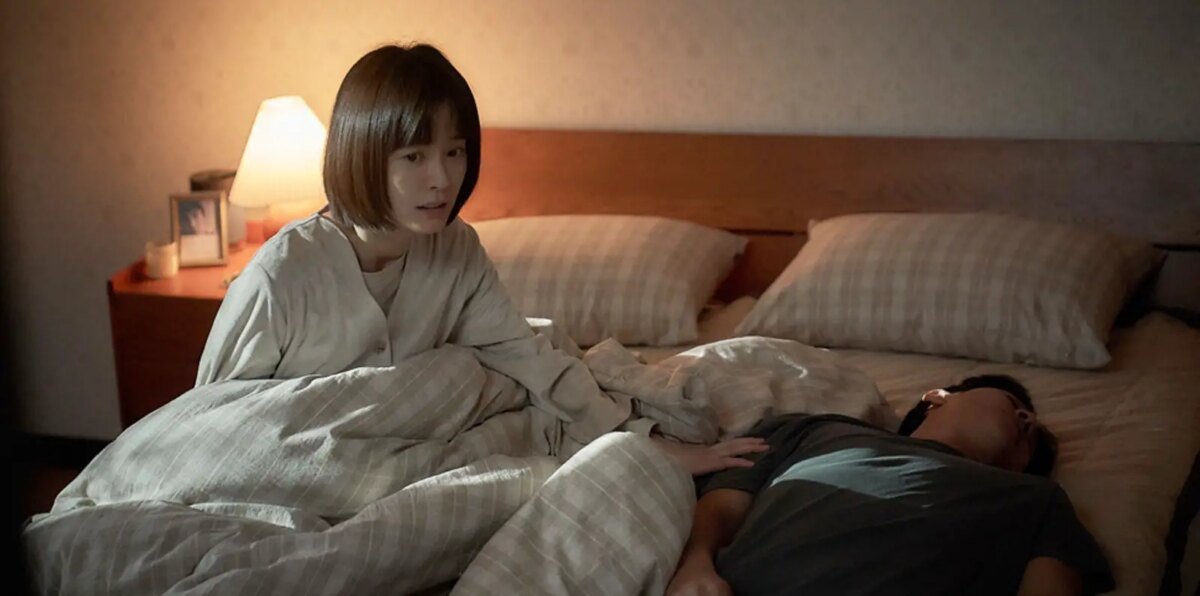
TORONTO INTERNATIONAL FILM FESTIVAL 2023 REVIEW! What writer-director Jason Yu’s Sleep truly lacks is an incisive soul. In all other areas, Yu’s feature debut carries a surfeit of quirk and dynamism. It is a cleanly shot film with a crisp, no-nonsense pace. Its narrative is novel enough to be compelling, and the horror setpieces build in clever ways. But while the technical building blocks are well-executed, its core is a touch lukewarm — Yu creates lofty expectations that he can’t ultimately meet.
Hyun-su (Lee Sun-kyun), an up-and-coming actor, and Soo-jin (Jung Yu-mi), a business executive and expectant mother, are newlyweds. One night, Soo-jin awakens to see her husband at the edge of the bed, muttering ominously to himself. From there, Hyun-su’s fits of sleepwalking worsen. As they escalate from the bizarre to the outright sinister, Soo-jin must quickly determine a solution for the safety of herself and her eventual newborn.
Sleep is divided into a three-chapter structure that functions much like a play. Via this skeleton, the filmmaker is able to impart his characters and story with social acuity. For example, Hyun-su, while a loving husband, solves all of his problems in ways that appear logical, as an actor would. Soo-jin, conversely, approaches issues in a highly systematic way, not unlike an executive.
“…Soo-jin awakens to see her husband at the edge of the bed, muttering ominously…”
Yu also sneaks in slight but no less thoughtful commentary on the society these characters inhabit. When the suggestion arrives that Hyun-see’s sleepwalking might be supernatural in nature, the director artfully allows the idea of mythological evil to run parallel to a culture of unrealistic expectations. This allows for ample thought-provoking scenarios to be hinted at.
Technically, the filmmaker is textbook in his execution. Sleep glides from frame to frame on the back of clean cinematography. Every scene is perfectly concise, never too short or too long. And when the more horrifying moments arrive, a few key angles create moments of tremendous dread. In addition, well-known Korean actors Lee Sun-kyun and Jung Yu-mi give performances that could be easily overlooked for how natural and intimate they are on-screen. They provide a genuine connection between their characters and the viewer.
However, the cruelest aspect is one of expectation. Each of the formal elements is so infused with Yu’s wit that much is anticipated as the film shuttles toward its climax. But when it arrives, it is frustratingly ambiguous. For the majority of the runtime, the script successfully calibrates a story that exudes perspicuity. However, the finale cannot make heads or tails of such insight, leaving the film at a thematic stalemate.
As such, Sleep is an oblong mirror of itself. On one hand, it is a good but seemingly typical genre film that has moments of uncanny intelligence. On the other, it is an uncannily intelligent work that eventually settles for simply being a good genre film. Either way, Yu has shown that he has much to offer, regardless of the disappointing conclusion. If he can harness his incisive nature more effectively, Yu will be a formidable director not just in horror but in any cinematic arena.
Sleep screened at the 2023 Toronto International Film Festival.














